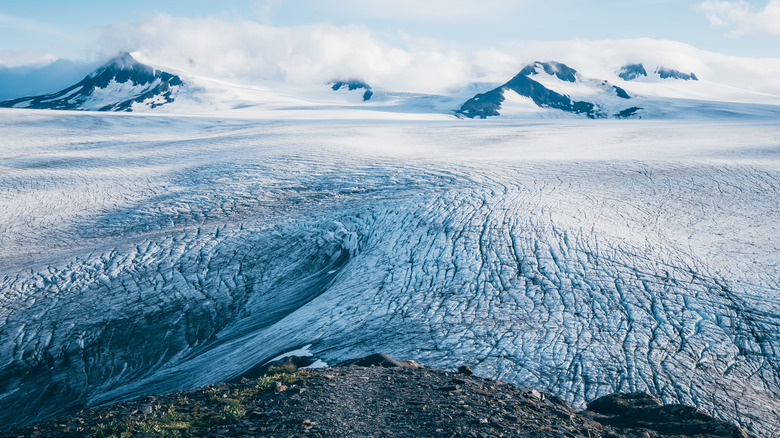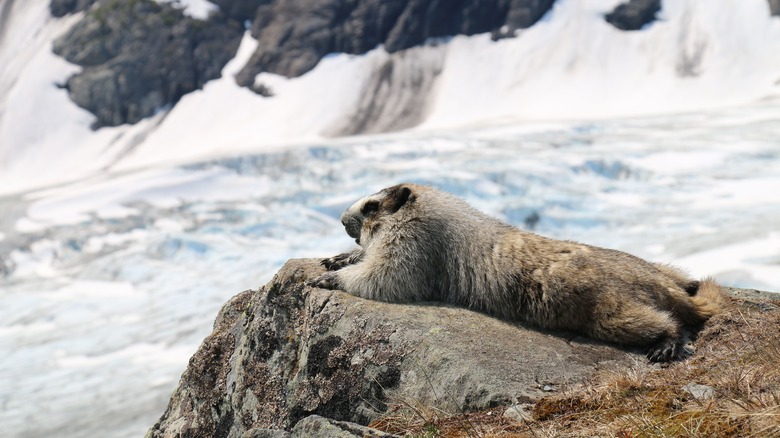Hiking
Jen Ottolino
At the Exit Glacier in Alaska’s Kenai Fjords National Park, hikers can have a once-in-a-lifetime experience of walking up to a massive sheet of glacial ice, seeing its strange blue light, and hearing it pop and crackle. Exit Glacier is one of 38 glaciers that flow from the Harding Icefield, which extends for 700 square miles and isone of four major icecaps in the U.S. Due to its proximity to the nearby town of Seward, a popular tourist hub on the Kenai Peninsula, Exit Glacier is one of the most visited in the world.
Before setting off into this mysterious and unpredictable landscape, though, you should know a few things. This guide covers general facts about the glacier and the park, trail options, hiking preparation, and essential tips for a safe and enjoyable journey. When planning your trip, note that Kenai Fjords National Park is open year-round, but the road to Exit Glacier is closed to vehicle traffic when there’s snow and ice. The best time to hike to the glacier is from Memorial Day through Labor Day, when the trails are clear of snow and facilities such as the Exit Glacier Nature Center are open.
Trails to the glacier

attilio pregnolato/Shutterstock
There are a few different trails leading up to and around Exit Glacier. These trails range in difficulty from a short accessible loop to longer treks that are much more strenuous. All trails begin at the Exit Glacier Nature Center in Kenai Fjords National Park.
The Glacier View Loop is a 1-mile, wheelchair-accessible loop that starts at the nature center parking lot and winds through a cottonwood forest past the toe of the glacier. This trail provides a panoramic view of the glacier before circling back to the parking area. Alternatively, hikers can exit the loop and take the Glacier Overlook Trail for another 0.6 miles for a higher view of the glacier and valley below. Both of these trails are considered easy routes with minimal elevation gain and take an hour or less to complete.
The most grueling route near the glacier is the Harding Icefield Trail, which is an 8.2-mile round trip that takes around six to eight hours to complete.The trail climbs 3,000 feet as it runs parallel to the northern edge of the glacier, with spectacular views along the way. At the end of this trail, hikers are rewarded with a sweeping vista of the enormous ice field. Those who crave an even closer encounter with the glacier can embark on an exhilarating, guided ice-hiking or ice-climbing trip onto the glacier itself with Exit Glacier Guides.
Preparations for hiking at Exit Glacier

Wirestock/Getty Images
Preparation is key to happy and safe hiking around Exit Glacier, particularly if you’re doing the Harding Icefield Trail. First, it’s imperative to check the trail conditions before starting the hike. The higher parts of the icefield trail can be snowy until early July, with the very real possibility of avalanches. Check the forecast, and wear weather-appropriate clothing, including plenty of sunscreen on sunny days. But regardless of the forecast, be prepared for storms, wind, bright sun, and rapidly changing conditions. Wear solid hiking shoes or boots, as the terrain can be rocky and uneven. Bring at least a half gallon of water per person, and to avoid contracting giardiasis (a diarrheal disease caused by a parasite), don’t drink water out of any streams unless you have a high-quality filter.
In addition to these guidelines, please protect the alpine vegetation by staying on the marked paths. Don’t be one of the careless hikers who contribute to the destruction of these fragile ecosystems by cutting switchbacks or wandering off the trails. Also keep in mind that the area around Exit Glacier is home to wildlife, including black bears. Make noise while hiking to alert bears of your presence and never, ever get between a mama bear and her cubs. Finally, pack out all your garbage, including toilet paper. Mother nature and other hikers will thank you wholeheartedly as you visit one of the most spectacular glaciers.

